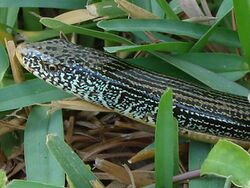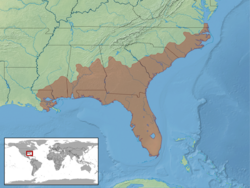Biology:Eastern glass lizard
| Eastern glass lizard | |
|---|---|

| |
| Scientific classification | |
| Domain: | Eukaryota |
| Kingdom: | Animalia |
| Phylum: | Chordata |
| Class: | Reptilia |
| Order: | Squamata |
| Family: | Anguidae |
| Genus: | Ophisaurus |
| Species: | O. ventralis
|
| Binomial name | |
| Ophisaurus ventralis (Linnaeus, 1766)
| |

| |
| Synonyms[2][3][4] | |
| |
The eastern glass lizard (Ophisaurus ventralis) is a species of legless lizard in the family Anguidae. The species is endemic to the Southeastern United States.
Description
Adults of O. ventralis grow to 46–108 cm (18–43 in) in total length, although the head-body length is only 30.5 cm (12.0 in) at most. There are 99 or more scales along the lateral groove. In this species, no dark longitudinal stripes are present below the lateral groove or under the tail, and there is no distinct mid-dorsal stripe. The neck is marked with a series of mostly vertical, or highly irregular, white marks, with white markings on posterior corners of scales. Dorsally, older specimens have a pattern consisting of numerous longitudinal dark lines or dashes. Occasionally, similar parallel lines cover the entire mid-dorsal area. Older adults may be greenish above and yellow below; this is the only Ophisaurus species that may have a greenish appearance. Juveniles are khaki-colored and usually have two dark stripes that run down the back.[5]
No subspecies are currently recognized.[2]
Distribution
O. ventralis is commonly found from extreme southeastern Virginia to south Florida and west to Louisiana. Isolated records exist of its occurrence in Oklahoma and Missouri.[5]
Diet
O. ventralis eats a range of insects, such as grasshoppers, crickets and beetles, and will also consume spiders, small mice, snails, and the eggs of other reptiles and ground-nesting birds. Unlike snakes, glass lizards do not have flexible jaws, and this limits the size of prey items they can consume. They forage both above ground and underground in burrows.
Gallery
References
- ↑ Hammerson, G.A. (2007). "Ophisaurus ventralis". IUCN Red List of Threatened Species 2007: e.T63721A12710178. doi:10.2305/IUCN.UK.2007.RLTS.T63721A12710178.en. https://www.iucnredlist.org/species/63721/12710178. Retrieved 19 December 2019.
- ↑ 2.0 2.1 "Ophisaurus ventralis ". Integrated Taxonomic Information System. https://www.itis.gov/servlet/SingleRpt/SingleRpt?search_topic=TSN&search_value=174110. Retrieved 30 June 2008.
- ↑ "Ophisaurus ventralis ". The Reptile Database. www.reptile-database.org.
- ↑ Stejneger L, Barbour T (1917). A Check List of North American Amphibians and Reptiles. Cambridge, Massachusetts: Harvard University Press. 125 pp. (Ophisaurus ventralis, pp. 60-61).
- ↑ 5.0 5.1 Conant R (1975). A Field Guide to Reptiles and Amphibians of Eastern and Central North America, Second Edition. (First published in 1958). Boston: Houghton Mifflin Company. xviii + 429 pp. + 48 plates. ISBN:0-395-19979-4 (hardcover), ISBN:0-395-19977-8 (paperback). (Ophisaurus ventralis, pp. 132-133, Figure 30 + Plate 13 + Map 95).
Further reading
- Behler JL, King FW (1979). The Audubon Society Field Guide to North American Reptiles and Amphibians. New York: Alfred A. Knopf. 743 pp. (Ophisaurus ventralis, pp. 544–545 + Plates 453, 456).
- Daudin FM (1803). Histoire Naturelle, Générale et Particulière des Reptiles; Ouvrage faisant suite aux Œuvres de Leclerc de Buffon, et partie du Cours complet d'Histoire naturelle rédigé par C.S. Sonnini, membre de plusieurs Sociétés savantes. Tome septième [Volume 7]. Paris: F. Dufart. 436 pp. (Ophisaurus ventralis, new combination, pp. 352–356 + Plate LXXXVIII). (in French and Latin).
- Linnaeus C (1766). Systema naturæ per regna tria naturæ, secundum classes, ordines, genera, species, cum characteribus, diferentiis, synonymis, locis. Tomus I. Editio Duodecima, Reformata. Stockholm: L. Salvius. 532 pp. (Anguis ventralis, new species, p. 391). (in Latin).
- Smith HM, Brodie ED Jr (1982). Reptiles of North America: A Guide to Field Identification. New York: Golden Press. 240 pp. ISBN:0-307-13666-3. (Ophisaurus ventralis, pp. 90–91).
- Zim HS, Smith HM (1956). Reptiles and Amphibians: A Guide to Familiar Species: A Golden Nature Guide. Revised Edition. New York: Simon and Schuster. 160 pp. (Ophisaurus ventralis, pp. 67, 155).
External links
- Eastern Glass Lizard (Ophisaurus ventralis) at SREL Herpetology. Accessed 30 June 2008.
- Eastern Glass Lizard (Ophisaurus ventralis) at Virginia Dept. of Game and Inland Fisheries. Accessed 30 June 2008.
Wikidata ☰ Q3015380 entry







